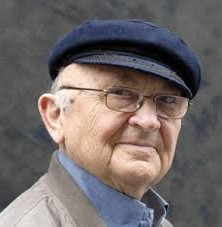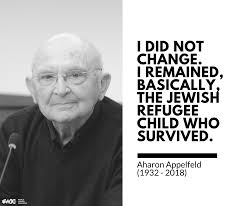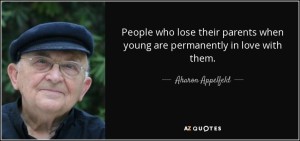 On January 4, Israeli and the world lost a great writer. Holocaust survivor, novelist, prize winner Aharon Appelfeld died in Petah Tikva, Israel at the age of 85.
On January 4, Israeli and the world lost a great writer. Holocaust survivor, novelist, prize winner Aharon Appelfeld died in Petah Tikva, Israel at the age of 85.
Born in what is now Ukraine, in 1946 Ervin Appelfeld arrived in pre-state Israel shortly after the war. Now called Aharon, he learned Hebrew, served in the army, graduated from Hebrew University and taught literature at Ben Gurion University. He eventually was reunited with his father whom he thought was dead. Unfortunately, the two had a strained relationship.
 Appelfeld’s experiences in the Holocaust- as a virtual orphan, on the run, imprisoned in a concentration camp, hiding for three years, serving as a cook with the Soviet army, living in an Italian DP camp- became the inspiration for his more than 40 books. His work won close to 40 literary prizes, both Israeli and foreign. Badenheim 1939, his first novel, is considered a classic Holocaust book- perhaps even the greatest in the genre. His last was published months before his death.
Appelfeld’s experiences in the Holocaust- as a virtual orphan, on the run, imprisoned in a concentration camp, hiding for three years, serving as a cook with the Soviet army, living in an Italian DP camp- became the inspiration for his more than 40 books. His work won close to 40 literary prizes, both Israeli and foreign. Badenheim 1939, his first novel, is considered a classic Holocaust book- perhaps even the greatest in the genre. His last was published months before his death.
Among his awards were The Bialik Prize, the Israel Prize, the National Jewish Book Award, the Prix Medicis, the Nelly Sachs Prize, the Sydney Taylor Book Award, and the Independent Foreign Fiction Prize.
About writing in Hebrew rather than his native tongue or one of the other languages he spoke before he learned Hebrew, Appelfeld said “I’m lucky that I’m writing in Hebrew. Hebrew is a very precise language…This is because of our Bible tradition…you have very small sentences, very concise and autonomous. Every sentence, in itself, has to have its own meaning.”
Although Appelfeld was a Holocaust survivor, his books often treat the subject subtlety through images and through suggestion. There is silence, muteness, and stuttering. Philip Roth, whose Operation Shylock has Appelfeld as a character, said of his friend that he is “a displaced writer of displaced fiction, who has made of displacement and disorientation a subject uniquely his own.”
 For much of his life, Appelfeld wrote in longhand and typed his own novels. He would begin with notes-frequently sitting in a café for hours writing on ordinary paper. He said that the cafes reminded him of the Romanian cafes of his youth. He “likes paper-writing, like every art, is a sensual art. You have to touch it, you have to feel it, to correct, again to correct, always to correct.” He would often stash his scrawled notes in drawers and years later return to them.
For much of his life, Appelfeld wrote in longhand and typed his own novels. He would begin with notes-frequently sitting in a café for hours writing on ordinary paper. He said that the cafes reminded him of the Romanian cafes of his youth. He “likes paper-writing, like every art, is a sensual art. You have to touch it, you have to feel it, to correct, again to correct, always to correct.” He would often stash his scrawled notes in drawers and years later return to them.
This unconventional approach seemed to work.
The library has many books by Appelfeld. They are located in the fiction section.
The following books about Appelfeld are available through the BCCLS library system:
Appelfeld, Beyond despair: three lectures and a conversation with Philip Roth
Appelfeld, The Story of a Life. Appelfeld’s autobiography
Ramraz, Aharon Appelfeld: The Holocaust and beyond
- Is It Passover Yet? - Thu, Apr 18, 2024
- MESH Report April 9, 2024 - Thu, Apr 11, 2024
- Guess Who? - Wed, Mar 13, 2024
